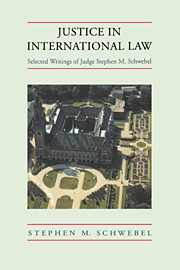Book contents
- Frontmatter
- Contents
- Preface
- PART I International Court of Justice
- PART II International Arbitration
- PART III United Nations
- 15 The Origins and Development of Article 99 of the Charter
- 16 The International Character of the Secretariat of the United Nations
- 17 Secretary-General and Secretariat
- 18 A United Nations “Guard” and a United Nations “Legion”
- 19 Mini-States and a More Effective United Nations
- 20 Article 19 of the Charter of the United Nations: Memorandum of Law
- 21 The United States Assaults the ILO
- 22 Goldberg Variations
- PART IV International Contracts and Expropriation
- PART V Aggression under, Compliance with, and Development of International Law
- List of publications
- Index
21 - The United States Assaults the ILO
Published online by Cambridge University Press: 06 November 2009
- Frontmatter
- Contents
- Preface
- PART I International Court of Justice
- PART II International Arbitration
- PART III United Nations
- 15 The Origins and Development of Article 99 of the Charter
- 16 The International Character of the Secretariat of the United Nations
- 17 Secretary-General and Secretariat
- 18 A United Nations “Guard” and a United Nations “Legion”
- 19 Mini-States and a More Effective United Nations
- 20 Article 19 of the Charter of the United Nations: Memorandum of Law
- 21 The United States Assaults the ILO
- 22 Goldberg Variations
- PART IV International Contracts and Expropriation
- PART V Aggression under, Compliance with, and Development of International Law
- List of publications
- Index
Summary
David A. Morse, after twenty-two years of distinguished service as Director General of the International Labor Office, was succeeded in May, 1970, by C. Wilfred Jenks. The election of Dr. Jenks, then Principal Deputy Director General and an official of the ILO for almost forty years, although closely contested, was widely welcomed, not least by international lawyers, among whom Dr. Jenks had long been so eminent. The United States supported Dr. Jenks's election.
On July 31, 1970, Congressman John R. Rooney of New York, submitting that “this bird Jenks thinks he has inherited the ILO lock, stock and barrel,” concluded that “Mr. Jenks needs to be rocked. I know of only one way to rock him, cut off his water.” Congressman Rooney suggested that the Assistant Secretary of State for International Organization Affairs telephone the Chief of the United States Mission in Geneva, “Ambassador Rimestad and tell him to hotfoot it over to Mr. Jenks and tell him before nightfall that there will be no money for the ILO.” Congressman Rooney did not wish the purposes of this threat to be concealed. On the contrary, he declared that “Mr. Jenks should have a copy of this record air mailed to him as soon as it is printed … Maybe it will help him … He might change his mind. I will lay odds that he eventually will.”
The subject of the change so to be induced in the mind of the ILO's Director General was the appointment of an Assistant Director General of Soviet nationality (who ranks eighth in the ILO hierarchy, and who heads a department concerned with social security and maritime and certain other affairs).
- Type
- Chapter
- Information
- Justice in International LawSelected Writings, pp. 364 - 371Publisher: Cambridge University PressPrint publication year: 1994



